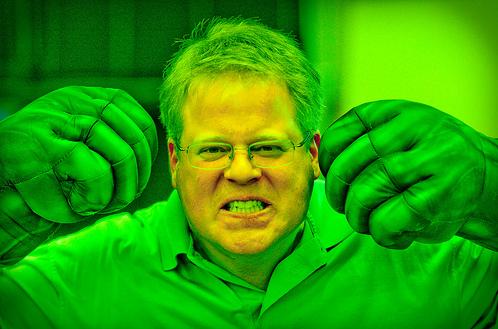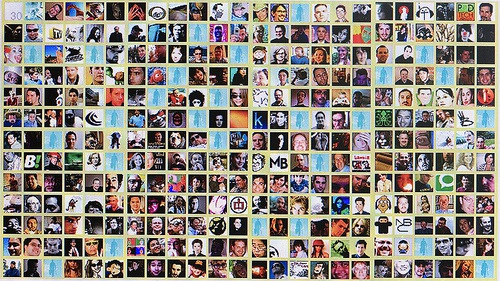UPDATE 10/06/2010: In retrospect, I was completely wrong. It had to happen sooner or later. Read the rest at your own risk.
—————–
Buzz is a breath of fresh air in an increasingly noisy social media world. Why do I think it’s superior to Twitter, Facebook, and Friendfeed?
Let’s take the easiest comparison first:
Buzz vs. Friendfeed
Right now, Buzz basically is Friendfeed but with immediately greater penetration. Real conversations with more people.
[BTW I know I have Buzz on the brain because I just tried to create italics in this blog post _this way_]

(Crazed Hulk Scobleizer) by Thomas Hawk
One interesting difference though, is that people seemed to like the 3.0 aggregator aspect of Friendfeed but:
- Buzz users hate noise, and
- They unfollow people who add Twitter and Friendfeed streams to their Buzz streams.
Buzz beats Friendfeed because Buzz is bigger.
Buzz vs. Twitter
As much as I loved Twitter in 2008, I loved it less in 2009 when celebrities took over, and I can take it or leave it now that it’s all botted-out.

(Twitter peeps) by Thomas Hawk
I still tweet people and @reply them. What I find so dissatisfying is how short and superficial the conversations are. It’s a great place for a quick joke or comment, but 140 characters is limiting, and a lot of conversations end more quickly than Buzz conversations.
This blog post’s many cool quotes (below) are substantial because they came from a Buzz conversation. If they were tweets, they wouldn’t stick to your ribs so much.
Another advantage Buzz has is that you can see how many people are likely to hear you if you comment, and the gmail integration ensures people will return to reply.
Buzz beats Twitter because Buzz has:
- Longer, more substantial conversations, with
- More replies and
- More attention from participants.
Buzz vs Facebook
As I’ve said, people seem less tolerant of noise on Buzz. No pokes, Zombie kisses, or farming games on Buzz. There’s less downside for ADD folks (and some research suggests that computer multitasking makes our brains temporarily ADD even if we’re not genetically that way).
Less distraction means more focused interaction, and more likelihood of substantial conversation.

Portrait of Buzz by Thomas Hawk
As my fellow Buzzer Thomas Lucas says:
Facebook is very social and “everyone is on it” but it is becoming MySpace really fast. I think the future of real social interactivity and news will be buzz. You can have conversations that are real-time and in order-you don’t have to keep scrolling/clicking to find out what tweet people are answering. And the “no frills” of Google will HOPEFULLY keep the farms, mafias and daily horoscopes out of buzz. Tweet your “thoughts”, plant some crops and talk to that “hot girl” from high school on Facebook and keep buzz for news and conversations.
More comparisons from Myrna Weinreich:
Love Buzz, not sure exactly why but ‘deeper’, richer than FF and definitely more than FB which is usually (not always) a superficial ‘hey there, whatcha doin’.
And down the road, if ads come to Buzz they’ll likely be AdWords text ads, which are much less distracting that the image/banner ads we see on other social platforms. AdWords text ads are semantically relevant, and tend to be more of a service to the user than other ad types. Relevant ads won’t diminish conversation as much as other ad types on other social sites do.
Buzz beats Facebook because Buzz protects conversations from noise and spam.
Change, Social Platform Identity, and Survival
It does seem that MySpace-ification is a danger for all social networks. As soon as you try to make the social platform a place where people can live their entire lives, you junk it up, and the noise obstructs real interaction.

No Dumping by Observe The Banana
Twitter has stayed focused, but their API lets in a lot of noise. Hopefully Buzz will remain focused and add the connected sources filter Buzzers are asking for (so they can follow you but filter out your tweets, if they like).
Here are a few a the things Robert Scoble wants from Buzz, many of them related to noise:
#1. I need noise filters.
#2. I need noise filters.
#3. I need noise filters.
#4. I need noise filters.
#5. I need noise filters.Oh, sorry, my Twitter import just barfed.
Let’s start again.
#1. I need a way to remove Tweets. All Tweets. I haven’t seen a single Tweet that is not noise here.
#2. I need a way to remove whenever Jesse Stay talks about FriendFeed. That’s noise.
#3. I need a way to remove all the reposts of Mashable or Techcrunch items. That’s noise.
#4. I need a way to only display items that get engagement. That would remove noise.
Here’s another post about noise and Smart Filtering.
Louis Gray mentioned a ProBlogger (Darren Rowse) post about defriending most of his Facebook friends, because he’s shifting FB use from blog promotion back to its original friend/personal usage. Andy Beard is experimenting with leaving Twitter (he’s not the first and won’t be the last). Do these two movements mean anything larger?
Most assuredly they underscore that everything changes. In the midst of this change, the social platform that enables conversation and protects us from noise and spam will enjoy the greatest success.
Different Strokes for Different Folks
Ultimately, as cool as the versus metaphor is, it’s not about one platform winning, but each one having strengths, and each attracting an audience that prefers that communication style:
Something I think alot of people forget is that the very nature of each of these apps/sites is different, and attracts a different audience. Of course, there is always some crossover, but my own audience is quite different in each of the properties.. Just because of the variability of the features/formats, etc.
A lot of people make the mistake of just dumping anything and everything to every social media outlet (Scoble, Pirillo, etc). The real key for businesses is to have content keyed/tweaked to each of the sites.
Engaging in conversation appropriate to each of the mediums as it were.
Brian Carter is Director of SEO, PPC, and Social Media for Fuel Interactive, cofounder of TweetROI, and a passionate keynote speaker.




![[SEO, PPC & Attribution] Unlocking The Power Of Offline Marketing In A Digital World](https://www.searchenginejournal.com/wp-content/uploads/2025/03/sidebar1x-534.png)